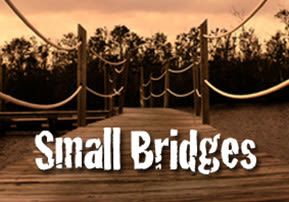
Small Bridges
Everyone's life is filled with "small bridges." The person who succeeds in passing over them is the one who remains faithful to the principles of truth that he knows are right.

Part 8 of “The Journey,” by Erez Moshe Doron: an elaboration of Rebbe Nachman’s famous tale of “The Rabbi and the Only Son”
They began to travel until the father and son came to a small bridge. One of the horses fell down….
The small bridge is the real test and challenge in a person’s life. It is small in comparison to the search for truth and the way which a person is seeking.
The test will determine if a person is serious about the quest and if he is worthy to achieve that which he is seeking.
What is the essence of this test? A person is in a situation where he knows and understands that he has to behave in a particular way (for example, not to smoke). Then there will arise against the intellect his physical desires which owe no obligation to intellectual values. They want. How will a person react to this conflict? Will he allow the brute force of his desires to be victorious, even though they will harm him in the end? Or, will he listen to intelligent instructions?
Everyone’s life is filled with “small bridges.” The person who succeeds in passing over them is the one who remains faithful to the principles emanating from his mental conclusions and the knowledge he has learned. He will arrive at the end.
The coach overturned...
Of course it overturned. It had to. Whenever a person who is accustomed to do whatever he wants attempts to enforce the rule of reason upon his life, then there is an immediate short-circuit in the system. The body rebels, and this is expressed by difficulties, whether mental, emotional or by outside obstructions imposed through the events of a person’s life.
These difficulties are the overturning of the coach. A person may choose not to see them as challenges to be overcome. Instead, he wants to see them as signs that the effort of the journey is not for him. That person might as well return home to his previous habits, to the unfettered life free from thought and purpose. He can “untie” all the harnesses in favor of the willfully permissive life because he has no need for restraints.
…And they were nearly drowned.
The addition of these words is in order to present a different problem which is likely to arise in this situation. We will explain it first with an example. Sometimes when a person presses on the gas too much, the force needed to keep the car under control becomes too much for him. Sometimes, because of the will to advance spiritually, a person takes too much upon himself at one time. This can become a burden of responsibility which will eventually force him to withdraw because he needs to relieve the pressure.
Later in the story when the father and son set out a second time the axles of the coach will break. This is an obstacle similar to the first one. Unexpected fears and wild imaginations lay in wait for the spiritual seeker. They make pressure and may break his will. If his eyes are lifted too high, to unrealistic goals, then he may become filled with fear or despair. Eventually he will be forced to abandon the journey.
The lesson to be learned is simple. A person who is searching must always concentrate upon the situation in which he finds himself, and upon the next rung of the ladder which marks his spiritual advancement. If he looks too high, he will immediately begin to form a “fear of heights” and fall. An eloquent warning about this danger appears in one of our holy books: “What is wondrous above you, do not investigate; and what is hidden from you do not search out.”
The son returned to his studies, but the feeling of deficiency, that he was missing something and he did not know what, also returned.
One who understands that he is compelled from the depths of his being to find true meaning will not deny that familiar feeling of deficiency. Despite difficulties and falls he will constantly go out again and again to journey on the way. Whatever will be will be. In the face of this stubborn persistence nothing can stand in his way. He will fix the wagon and go on.
On the other hand, one who seeks the truth as an intellectual adventure or because it is “far out” will fall in the first battle.
Although the son in this parable has returned home, he cannot ignore the feeling gnawing away inside of him. Since he really wants to find the truth, he does not concede. It is important to him. His life is at stake.
…The feeling of deficiency returned.
A person’s soul continues to demand her portion no matter what happens. “Go and seek,” she constantly chides until her last day. The soul knows very well that she was not put into a body of flesh and blood to just eat and drink. She knows very well that she did not descend into this mournful world just to make a career, acquire a little entertainment and die. It is absolutely clear to her that there is another purpose.
Once a person realizes this, then he knows that thoughts driving him to seek a deeper and truer meaning are actually the voice of the soul calling to him. He hears her much better, and the chance of finding that which he has been seeking is much greater.
Most people never absorb the fact that it is the voice of their souls that they are hearing. Instead, with myriad devices they try to suppress the voice, as we have already discussed.
To be continued.
***
With sincere gratitude to www.levhadvarim.com














Tell us what you think!
Thank you for your comment!
It will be published after approval by the Editor.